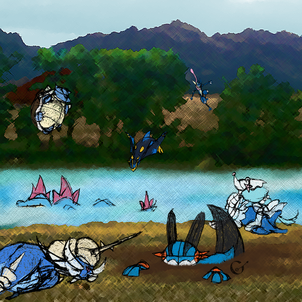 Over the years I have defeated almost every region’s Elite Four with my starter pokémon as team captain*. We ended each game together, just as we started it, until the more recent games. In Omega Ruby, I deposited my swampert into the pc early during the game. In Sun, a traded incineroar has become my team captain*. What changed? Well, recently I noticed a phenomenon I refer to as starter pokémon syndrome. It’s when I blindly make my starter pokémon team captain without researching other possible options. I would make the decision based only on loyalty to my starter pokémon, and not use other research to validate my decision was best for my team. Starter pokémon syndrome also happens in real life too. Take my starter bank, for example. Over 16 years I blindly opened two checking accounts, two savings accounts, and a credit card. Once I realized what was happening, I was able to research a better option to make my financial pokémon team stronger. What Is a Starter Pokémon?
In the Pokémon games, wild pokémon appear in tall grass and trainers need their pokémon as protection. Starter pokémon are the pokémon given to young trainers, usually at 10 years old, to protect them as they adventure outside their hometown. It is common for trainers to develop a special bond of friendship with their pokémon, like Ash and Pikachu. Starter pokémon are special to these trainers because they give them independence. When I was about 10 years old, my bike gave me the same sense of freedom. It allowed me to travel on my own wherever and whenever I wanted. In high school, my driver’s license increased the size of the world I could explore. My starter bank started my journey towards financial independence from my parents. When it became time to go to college, I opened my first checking account and received my first credit card. Finding a Comfort Zone As the trainer and their pokémon explore, the trainer catches addition pokémon for the trainer to pick six from to build a team for battling. The more pokémon a trainer catches, the more combinations available for their team. When it came to building my team, I always had the most experience with my starter pokémon. It was usually the strongest on the team and even helped the newer teammates grow. They became my “ol’ reliables” that I would use as a last resort during gym battles to win badges. It comforted me to always have them around as team captain. It just made sense. As for my starter bank, I started an annual ritual of financial reviews when I was about 20 years old. A banker and I would review all of my accounts. We discussed an overview of my finances, habits to make my finances stronger, review new policies with my accounts and answer financial questions I had. I developed a relationship with my bank through these reviews that comforted me about my personal finances. As far as I knew, my bank was the strongest financial tool I had and it appeared obvious that it should be team captain. Starter Loyalty Blindness When building a pokémon team, the strongest teams include a variety of typed pokémon, such as grass, fire or water, that balances type weaknesses. Because of my bond with my starter pokémon, I would choose them as team captain. However, by being blindly loyal to my starter pokémon, I prevented myself from investigating other possible pokémon, with the same type, to fill that spot on the team. For example, in the Alola region, by choosing primarina for my team, it automatically eliminates 79 water type and fairy type pokémon, 26% of the pokémon from the region, from being evaluated for my team. This loyalty blindness prevents proper research and team development. By never researching those 79 other pokémon, I might be limiting my team’s potential strength. With a little bit of research, I can verify my decision and know I am making the best decision for my team. I’m not saying that primarina is a terrible choice, I’m just saying that making the decision without doing some research on other options first makes it a poor choice. During my financial reviews, my starter bank introduced interesting methods for using multiple accounts. Some of these ideas made sense at the time, but my loyalty blindness prevented me from researching other options at other banks. Instead of doing research first, I trusted my bond with my starter bank and signed up on the spot. This caused me to blindly open a second checking account and savings account without comparing what other options other banks may have had. Instead, I wholeheartedly trusted my bank to assist me with my finances, and that they would not just use our bond to bring them more business. Research, Options & Decisions Admitting when starter pokémon syndrome is taking effect is a hard thing to do. Once I realize and admit it to myself, I can start making better, informed decisions. Since Omega Ruby I have started to take a moment halfway through the story to confirm my starter pokémon is a good fit for my team by researching other pokémon of the region. During my research, I also determine which pokémon is a solid choice for my team’s captain. Once I know my options, I am prepared to make a well-informed decision on who will be on my team and team captain. In Omega Ruby my team excluded swampert, but became an inventive and powerful team that was unstoppable when battling the Elite Four. In 2015, I was extremely unhappy with my starter bank’s savings account's low-interest rate of 0.01%. I realized my starter pokémon syndrome was the only reason I even had the savings accounts in the first place. I did some research and discovered other banks that offered much higher interest rates. I started to weigh my options and gave my starter bank one last chance to raise it. I thought that after our 16-year bond they could figure something out. They could not. I promptly interviewed my top two choices for other savings accounts. Once I had all three options researched and the information in front of me, I decided to open a high-interest savings account at an online bank. The interest rate when I opened it was about 0.90% and has since grown to 1.20%. By recognizing my starter pokémon syndrome, I researched other options and made my financial pokémon team stronger. Sometimes, I have reviewed my options and still chose my starter pokémon as team captain. I review my cell phone plan once a year, and I have stayed with the same carrier every year. I have changed plans over the years, but they are still what works best for my team at this moment. Having an annual review helps prevent the starter pokémon syndrome from taking effect. With the sludge wave that hit my personal finances in June, cleaning up the mess has become an opportunity to further evaluate my starter bank. More on how I am making my financial pokémon team stronger later. Let’s chat: Do you have a starter pokémon syndrome story? How did you resolve it? Further Reading: NerdWallet- my favorite site for comparing financial tools It’s Not Too Late to Start Fighting (Even If You Might Not Win)- From Rags to Reasonable *In past posts, I have referred to the team captain also as my base pokémon. In both cases, they are the main pokémon that anchors my pokémon teams and I develop my team based on them.
7 Comments
9/14/2017 08:38:37 am
I haven't given loyalty blindness much thought, but you bring up an excellent point (and in Pokemon terms I understand, no less!). I think there's a lot of value in switching your loyalties, whether it's to a product you use, a bank, insurance, or even your job. We shouldn't stay with the same services just because it's familiar to us.
Reply
9/17/2017 06:59:16 pm
I'm glad I could introduce you to a new concept! Very well put. Thank you. :)
Reply
6/17/2024 07:06:27 am
Your appreciation means a lot! It's like putting together a puzzle—finding the perfect word is like finding that missing piece that completes the picture of your writing. Keep practicing, and you'll definitely see progress!
Reply
Leave a Reply. |
Bag Pockets
All
Blog
|
© 2016-2018 Tojo Designs/The Grown-Up Pkmn Trainer
Most images created for this blog are derivative works based on the copyrighted property trademarks, of The Pokemon Company Internationl, Inc. © 2018 Pokémon. © 1995-2018 Nintendo/Creatures Inc./GAME FREAK inc. Pokémon, Pokémon character names are trademarks of Nintendo.
Most images created for this blog are derivative works based on the copyrighted property trademarks, of The Pokemon Company Internationl, Inc. © 2018 Pokémon. © 1995-2018 Nintendo/Creatures Inc./GAME FREAK inc. Pokémon, Pokémon character names are trademarks of Nintendo.

 RSS Feed
RSS Feed